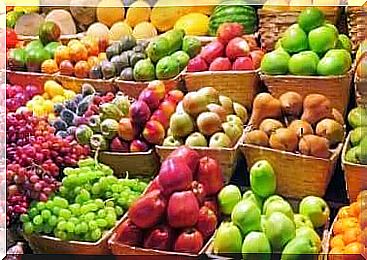Eat Fruit And Vegetables According To WHO?

The World Health Organization (WHO) is the body that keeps us informed about the right dietary practices for a healthy life. In this article, you will find out everything the WHO says about the need to eat fruit and vegetables.
As you well know, taking the right doses of vegetables is one of the eating habits associated with greater well-being. In some cases, they are even essential to prevent certain diseases.
The numbers speak for themselves
According to WHO reports, 1.7 million lives could be saved worldwide just by increasing the consumption of fruit and vegetables. It turns out that consuming an average of 400 grams of vegetables in the daily diet can help prevent chronic diseases such as diabetes or heart disease.
At the same time, insufficient fruit and vegetable intake is estimated to cause around 19% of gastrointestinal tract cancers, 31% of ischemic heart disease and 11% of cerebrovascular damage worldwide. All this is what is highlighted in an article published in the International Journal of Epidemiology.
It has also been shown that the ingestion of vegetables considerably reduces the risk of cardiovascular diseases, so daily consumption is recommended to ensure a better state of health.
On the other hand, fruits and vegetables contain high amounts of antioxidants, substances that delay aging and complex diseases associated with age, according to a study published in Current Aging Sciences.

Do we eat fruit and vegetables for fashion?
Although it is true that in recent times more and more people are betting on a healthy diet rich in fruit and vegetables, we can say for sure that it is a habit that goes far beyond simple fashion.
It is true that the number of vegetarians and vegans has increased, some due to trends and others due to factors such as religion or respect for animals. In any case, it is always crucial to know the right way to make the transition to this lifestyle.
Trendy or unfashionable, eating fruits and vegetables is necessary to maintain good health and prevent disease. The combination of these foods with others to create a balanced diet guarantees a good part of the essential nutrients for humans.
Fruits and vegetables every day
The indications of the World Health Organization (WHO) are as follows:
- Eat at least 400 grams or five servings of fruit and vegetables per day.
- Include vegetables in all meals.
- Prepare snacks with dried fruit and raw vegetables.
- Choose seasonal fruit and vegetables.
- Eat a large and varied selection.

There is also a worldwide promoting organization which follows the slogan of “5 a day” and which disseminates useful information to respect the minimum daily consumption, even adapting it to each country. A reaction is equivalent to:
- 140-150 grams of vegetables, raw and cleaned. Emphasize that it is advisable to eat two rations a day.
- 140-150 grams of fruit, raw and cleaned. The ideal is to consume 3 portions a day.
There are no restrictions on the maximum quantity to be consumed, the type of fruit or vegetables and the method of preparation. It is only recommended to vary the choice of vegetables and to prefer seasonal fruit and vegetables, which are fresher and cheaper.
If you don’t like some fruit or vegetable, you don’t have to force yourself to eat it, just select the ones you like and eat them several times during the day.
Consume fruits and vegetables regularly
Consuming fruit and vegetables is essential for staying healthy. It is important to ensure the presence of these foods in the everyday diet, with the aim of delaying aging and reducing the tendency to develop complex diseases.
If you don’t like the taste you can always eat them in combination with other foods and gradually increase the doses. There are many recipes that help you transform the appearance and flavor of vegetables to make them tastier if you are not used to eating them.
Finally, remember that you can always contact a nutritionist if you feel you need a consultation on your diet or the drafting of a healthier menu.









